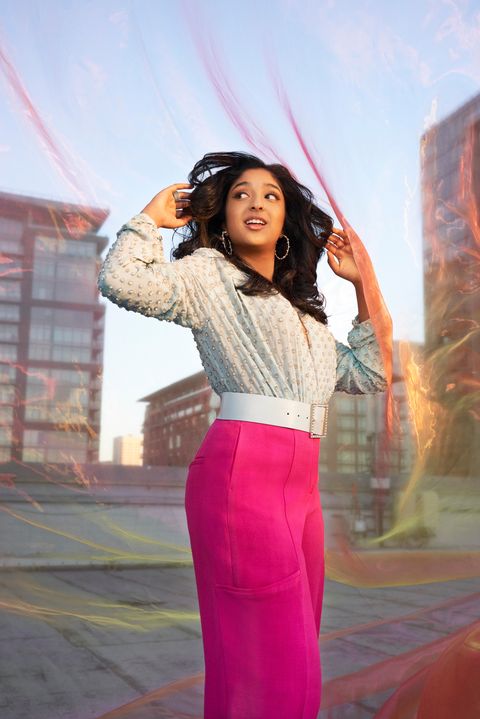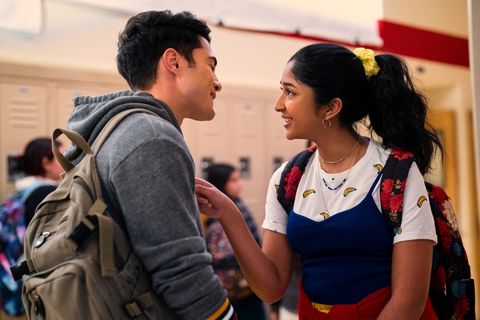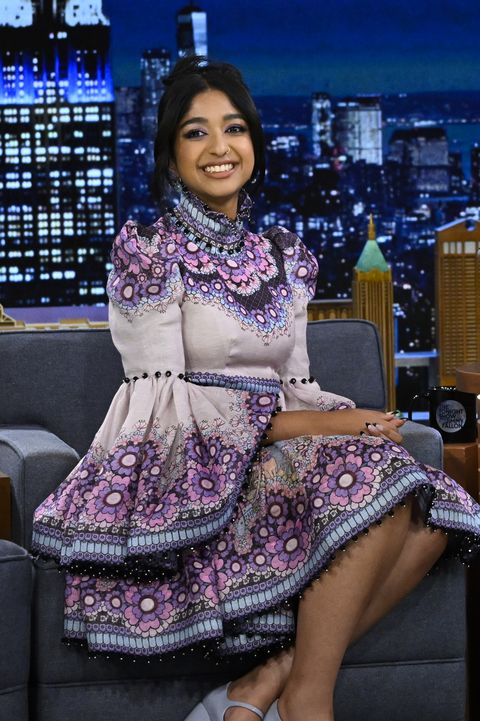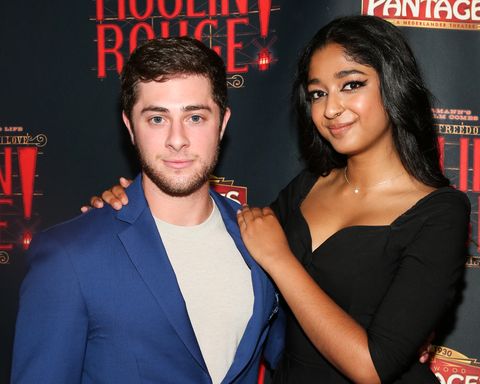Products You May Like
When she first appears, there are no screams, none of the hysterics so often finger-wagged at fan meet-and-greets. The crowd congregated outside Manhattan’s Paris Theater is calm, even reverent, squeezed up against a metal barricade and stretching their phones out so their cameras can capture, at least, the floating head of Maitreyi Ramakrishnan. She’s in New York to do the usual press circuit, but tonight, Aug. 9, she’s stopping by a special screening at the Paris for the third season of Never Have I Ever, the Netflix dramedy that granted the now-20-year-old a crash course in the Hollywood circus.
The theater inside is, apparently, already packed, which means the line of fans snaking around trees on 58th Street won’t get the chance to go inside, despite the free passes they reserved in advance. One of the venue staff corralling bodies reveals some fans had been waiting outside since before noon; it’s now 7:30 p.m. “I’m not surprised,” one young woman announces. “I’m just hopeful I’ll see one of the stars.”
The crowd thins out, some having abandoned any attempt at an early preview of season 3 before all the episodes arrive on Aug. 12. But others keep their phones aloft, fixated on either the Suburban idling outside the theater or the stage door, unsure where Ramakrishnan will appear first. Will she be leaving or arriving? At last, she emerges from the stage door; there’s a spasm of thrill, a sharp breath echoed from person to person in the huddled mass, but no screams. The audience can make out her words: “Thank you guys,” she says, clasping her hands together. “It really means a lot.”
Ramakrishnan presides over her audience with what might best be described as playful confidence. It’s not forced confidence, nor insouciant. She is graceful if not exactly poised; as she drifts along the line of fans to snap selfies and sign autographs, she repeatedly throws up a peace sign and pokes her tongue out the corner of her mouth. In a purple floral Zimmermann dress and chunky lavender platform heels, she might as well be the spokeswoman for Gen-Z as a brand, her curtain bangs brushed aside to reveal meticulously winged eyeshadow. This kind of look, she tells me, is a sign of real growth. She’s not the 17-year-old kid she was when she landed a Netflix role, Ramakrishnan says over Zoom a few weeks prior to the screening. “I don’t want to be my 17-year-old self. Oh my God, she had, like, questionable fashion taste, really questionable. Her eyeliner was not as sharp.”
After she escapes into the Suburban, taking her time to wave goodbye as the cheers finally mount, I hear a bystander sigh in contentment, almost relief. “She was so nice.”
Ramakrishnan has made peace with this funhouse-mirror side-effect of fame: After knowing Devi, her Never Have I Ever counterpart, fans think they know her. She occasionally pulls out a laundry list of differences between her and Devi, rattling them off like flash cards. For one thing, she was never as boy-crazy as the temperamental Devi Vishwakumar, whose dramatic love triangle at a California high school warrants narrative voiceover by tennis legend John McEnroe. “I was the kind of person that had one crush all throughout high school,” Ramakrishnan says. “And that carried me through.” Plus—unlike overachiever Devi—when Ramakrishnan was in school, she had no qualms with occasionally skipping class, showing up at 1:30 in the afternoon when the day officially began at 8:30 a.m. “But I still pulled the grade,” Ramakrishnan adds, with no small dose of Devi’s snark.
That’s the issue she’s up against. She tumbles into Devi-isms with quirky finesse, easily but not thoughtlessly, making the wall between them fluid, more water than glass. This natural effect was exactly what lured the show’s co-creators, Brooklyn Nine-Nine’s Lang Fisher and the now-legendary Mindy Kaling, to snag Ramakrishnan out of nearly 15,000 tapes. Her audition was something of a lark, a not-serious serious shot at fame during the exhilarating run-up to graduation.
“She really made us laugh—and she made us laugh naturally,” Fisher says of Ramakrishnan’s tape, sent in response to Kaling’s open casting call. “She was not the most polished actress, and she’d only had these high school shows that she had been in. But she had a really natural comedic ability, which you just cannot teach anyone. She was funny when she came in the room, and she had frizzy hair and thick glasses, was just like, ‘What’s up?’ She dabbed a couple times.” Kaling and Fisher whittled down the list to two final actresses: Ramakrishnan and “a very polished actress with a longer resume,” Fisher says. They went with Ramakrishnan. Adds Kaling, in an email interview, “Maitreyi had a fearlessness that made her stand out. She’s at once both completely relaxed and also focused, something you don’t see that often.”
Ramakrishnan, a high school student in Ontario at the time of her audition, had long treasured any snatched attention. (As the youngest sibling, she’s joked that she “made all of my brother’s birthday parties about me.”) But leading what Jimmy Fallon would later describe as a “giant, giant Netflix hit” would require a lot more than comfort with sustained perception. Kaling and Fisher never worried that Ramakrishnan had the talent, only that the pressure of carrying a major production—and the livelihoods of its cast and crew—might crush her. Or that the sudden onslaught of thousands of parasocial relationships might paralyze her. “There’s the feeling of, you’re giving this person an incredible gift,” Fisher says. “But there’s also the fear that you’re exposing them to the ugliest parts of Hollywood and humanity.”
At the show’s first table read, Ramakrishnan met Jaren Lewison and Darren Barnet, set to play Devi’s soon-to-be love interests Ben Gross and Paxton Hall-Yoshida, respectively. More than a decade her senior, Barnet was “pleasantly surprised” by Ramakrishnan’s unworried professionalism. “She’s like a prodigy of some sort,” he says during a recent call. “Like, you think about this girl who just came out of high school. She’s leading in a major show. She’s there working 12 to 14 hours every single day. And she’s never done anything like this.”
Ramakrishnan can recall the exact date Never Have I Ever season 1 landed on Netflix: “April 27, 2020,” she says. “So peak pandemic, right after Tiger King, Love Is Blind, Too Hot to Handle. So people’s standards were very—very receptive, we’ll say that.” There was no red carpet for Ramakrishnan or her co-stars, and all publicity was conducted over Zoom and social media. It took her a while to understand, as the show gained momentum, that real people were watching her as Devi, and those people would “know me before I know them.”
After season 1 arrived, she was initially nervous to step outside if she wasn’t in full makeup and wardrobe. “What if someone recognizes me and wants a picture? I don’t want that picture of me to look like I’m Hagrid from Harry Potter.” Today, she’s less concerned. “Now there’s times when I’m like, you know what? I love Hagrid.”
Season 3 of Never Have I Ever opens with the official introduction of “Daxton,” Devi and Paxton’s high-school hallway debut as a couple. After two seasons attempting to convince the resident dreamboat at Sherman Oaks High to have sex with her, Devi finally has Paxton holding her hand, kissing her by her locker, and inviting her on dates to California Pizza Kitchen. But this wouldn’t be Never Have I Ever without sideline pining from Ben Gross, Devi’s academic rival-turned-friend-turned-romantic interest, whose breakup with Devi’s friend, Aneesa (Megan Suri), opens up the door for renewed sparks. And we haven’t even addressed the delightful introduction of Anirudh Pisharody as Nirdesh, warping the love triangle into…well, a more complex polygon.
The sweet-but-substantive drama has mobilized fans from the beginning, and Fisher promises the show won’t cap its fourth and final season without a reigning champion. Who will ultimately win, Team Ben or Team Paxton? “There is a choice. [Devi] makes a choice…The winner wins,” Fisher teases. “The only problem with it is—now I’m learning, as we’re making season 4—I’m like, ‘One team is going to be real mad at me.’”
Ramakrishnan says that if season 1 was about Devi addressing the grief of losing her father, and season 2 was about Devi confronting her questionable decision-making, season 3 is when Devi finally studies the art of self-love. Such terrain served as a convenient training ground for Ramakrishnan herself, especially as her platform expands and the range of available work opens up before her. She feels responsible to the people who support her, the millions of followers that comment and tag and like her frequent Instagram and Twitter posts, who line up outside venues like the Paris for the chance to confess their love up close. But this responsibility comes conjoined with the inevitable cesspool of social-media discourse, in which Ramakrishnan’s projects—including Never Have I Ever and a voiceover role in Disney’s animated film Turning Red—have been criticized for the “sexualization of minors”; not accurately portraying Indian mother-daughter dynamics; the age gap between Barnet and Ramakrishnan; and “tired ethnic stereotypes,” to name a few. But Ramakrishnan has repeatedly insisted she’ll never win the representation battle alone. Never Have I Ever is not meant to stand for all South Asian identities and experiences, nor to be the quintessential, all-encompassing, perfect “brown show,” she says. “We’re not just the brown show. We’re a damn funny show. And we just happen to have a brown lead.”
Ramakrishnan, who is Tamil-Canadian, likens this issue to the fact that not enough so-called “brown shows” exist in the first place, which naturally forces the few to represent the many. “No one can satisfy everyone. If there are people out there in the world that don’t like golden retriever puppies, there sure as hell are going to be people that don’t like me,” she says. “Because I’m not as cute as a golden retriever puppy. And that’s just facts.”
But she shows no intention of hopping off her platform entirely—because she views it less a burden than a privilege. She wants to talk about what her followers are talking about, like abortion and Eurocentric beauty standards and South Asian representation. She also wants to gas up Blackpink and Doja Cat. Having the social following of a small country gives her ample opportunity to do both. “Because I have this platform that many would kill for…there is that idea of responsibility to speak up,” she says. “But what I will say is, I always stay authentic. I always make sure I read thoroughly. My logic is, if you’re going to post about it, be ready to talk about it in a live interview 10 minutes from now.”
It’s not lost on Fisher that such wisdom regularly evades Hollywood stars twice Ramakrishnan’s age. “I think she will have longevity in this industry, because she’s already had the moment where people have loved her and then people have said mean things to her,” she says. “She has moved forward and has stayed true to herself.”
Ramakrishnan respects her own growth enough to grant herself grace—“I think everyone is changed by fame; it’s just how you change is what happens”—but her tap dance between self-deprecating and back-patting accelerates when addressing her acting skills. Watching season 3, she notices the way her comedic timing has sharpened; she can now cry on cue; her command over a set is more intentional, less a byproduct of her lead-role status. Fisher and Ramakrishnan’s co-stars all describe her as immensely direct-able. Says Lewison, “She’s like a sponge. She absorbs so much information. She takes notes, some of the best I’ve ever seen anyone do it.” She believes in behaving as her character’s “best lawyer,” though that also means her self-criticism is deft and unflinching.
“Sometimes when I see clips from season 1, I cringe so hard,” she says. “Not because the story is bad or even the acting is bad, but I just know I’m watching this girl’s face and I’m like, ‘You have no idea what the shit you’re doing. You are just going with it. You are faking it ’til you make it right now.’”
But there’s no need to convince her she deserves marquee billing. She’s aware. “A lot of people are like, ‘Damn, your name is so long. Wouldn’t you have ever have wanted to shorten it?’” she says. “And I’m like, ‘Hell no, bro. You could see my credit a mile away. Are you joking?’”
Earlier this month, Ramakrishnan and the Never Have I Ever cast and crew wrapped filming on season 4, the final season and the show’s emotional send-off. The mood was bittersweet, though not somber: The cast hosted a carnival, and Fisher and Ramakrishnan both delivered speeches. A blooper reel re-played the cast’s funniest mistakes from all four seasons. During his own last day on set, Barnet wandered into Paxton’s now-empty garage with his cast-mate Ben Norris, who plays Paxton’s best friend. “We gave each other a hug and started crying,” Barnet says. “And it was crazy. We both were like, ‘I did not expect to cry.’…It really was that kind of aha moment, like, We did this.”
Ramakrishnan is trying to remember that, though the show might be over for her, most of the world has yet to watch more than half its total run. Season 3 is out today, and 4 won’t drop until next year, though she teases during our chat in June, “We got the script the other day and, damn, that’s all I’m going to say…There’s just so much. So much happens to these Sherman Oaks kids. They don’t catch a break.” Lewison backs up her account a few days before the cast wraps filming: “I think the way the writers approached this fourth season has been with such care and with such tenacious and meticulous planning that I think we all feel comforted by the fact that it was a perfect sendoff. This fourth season is perfect.”
Lewison says he and Ramakrishnan, who’s become one of his closest friends during their four-season run, frequently discuss what comes after Never Have I Ever. They were both recent high school grads when they started; now they’re official Hollywood up-and-comers, cheering on each other’s auditions and trying to understand how to budge an industry that’s famously inflexible, demanding, nepotistic, and money-hungry, despite its grand pronouncements in the name of art and meritocracy. Lewison admits he has his anxieties, but “I have no doubt that if there’s anyone in my life that can change the world through this business, I’ve really put my money on [Ramakrishnan],” he says. He later adds, “I have no doubt that her and I are going to be friends for life.”
But never again will Ramakrishnan have Never Have I Ever. It’s her first job, which many actors will tell you is like a first love. She acknowledges this without me needing to mention it. “No matter what project I get next—it could be the coolest project,” she begins. “It could be my dream role of Rapunzel. But it’ll never be the first exactly. It’s like your first dog. It doesn’t mean I’ll love the other dogs less. But Never Have I Ever will always be the first one.”
She’s keeping her options open, wanting to ride out Never Have I Ever before announcing her next big step. She wants time to be young, to see where this story goes, to look a little harder into the mirror between herself and Devi. Because, as she puts it, “I don’t think we ever really stop coming of age.” A shrug is audible in her voice when she lets slip, “However many years from now, maybe I get to pull a Mindy and I get to have my own production company that creates projects.” But that’s a classic Ramakrishnan-ism: self-assurance, paired with a winking slice of, Who knows? Who’d have thought?
Lauren Puckett-Pope is an associate editor at ELLE, where she covers news and culture.



